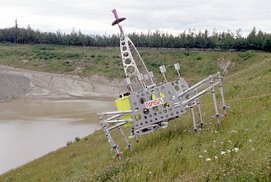
Figure: Remote presence medical robots are seen in action. Sorry ladies, no George Clooney or Patrick Dempsey models are forthcoming.Photograph by:QEII HalifaxInfirmary
Article by:
Charles Mandel , CanWest News Service
Published: Thursday, September 27, 2007
HALIFAX - The future of medicine took shape Wednesday in an isolated Cape Breton hospital, where a robot carried out a diagnosis of a patient.
Using the remote presence robot - a boxy unit with a screen showing the physician's face - a doctor in Halifax examined a patient five hours away at Cape Breton Regional Hospital.
Cape Breton is believed to be the first place in Canada to have the robot, thanks to a wealthy donor who believed the isolated region should have the technology. The RP-7 robots are in use in a number of hospitals in the United States.
Remote presence medical robots are seen in action. Sorry ladies, no George Clooney or Patrick Dempsey models are forthcoming.View Larger Image View Larger Image
Remote presence medical robots are seen in action. Sorry ladies, no George Clooney or Patrick Dempsey models are forthcoming.
Joseph Shannon, 67, donated $400,000 to the Queen Elizabeth II Health Sciences Centre Foundation so they could purchase the robot from a California company, In touch Technologies Inc. (and which had further modifications made to it in Halifax).
"One thing led to another and we decided we wanted to buy a robot for Cape Breton, said Shannon, who owns a transportation company.
Shannon said the robot will put Cape Breton Regional Hospital on the map and will make it easier for the facility to attract doctors who want to work with such advanced technology for consultations with specialists in other cities and other applications.
"I think in the long-term if they develop it properly, there will be a fairly significant economic impact for the region."
Ivar Mendez, the Halifax-based head of neurosurgery at QEII and of the medical facility's brain repair centre, operated the robot at Wednesday's demonstration. He said patients quickly become comfortable speaking with the robot and forget it's a piece of technology examining them.
"I strongly believe this technology is part of the future of medicine. It will bring the expert to the patient anywhere in the country," Mendez said.
Robots will not replace physicians, Mendez said. Rather, the neurosurgeon said they help provide universal health care to Canadians, ensuring that even individuals in remote communities will have access to specialized care.
The robot comes equipped with a powerful lens that sees better than a human eye and the technology can hold a patient's electronic records and tests and access them immediately. A doctor using a laptop and an Internet connection operates the machine.
It's not the first time QEII has used robotics. In 2002, the hospital used a $500,000 system in Halifax known as Socrates Robotic Tele-Collaboration to power a robotic arm to perform brain surgery on a patient a province away in Saint John, New Brunswick.







No comments:
Post a Comment